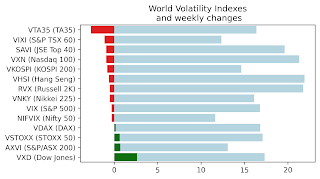Reader Mike sent me a question:
We know that the underlying value of VXX decreases daily, mainly by contango. Also, Put options written against the VXX decrease in value each day by theta decay. However, Put options rise in price when their underlying asset decreases in value. Thus, if volatility were held constant, would the contango of the VXX (which decreases the VXX value, thus increases a written put option value) override the theta decay incurred by that same written put option.My answer:
I ask this question in an attempt to determine if writing out of the money Puts against the VXX several months from expiration is a losing proposition given volatility is a constant.
Excellent question! Unfortunately, most interesting questions do not have a straightforward answer, so I will try to give you two perspectives on this. First perspective is from the theory, on how financial assets behave, and what we can expect in a market without frictions. Then I will try to show what we know empirically. Human language, at least casual conversation, sometime is very imprecise in description of probabilistic concepts. That is why you read statements like "VXX goes down" or "leveraged ETFs go down" or "long options lose money". This stems either from not understanding or not expressing properly all properties of expected future outcomes. Financial assets are usually bounded at zero and positively skewed (like on the chart above) and typical, most common, median outcome is lower than the expected, average, mean outcome. For leveraged ETFs I explained it on my blog, but even better here For VIX futures, or VXX things work the same way - most likely scenario is that your long position will decline in value, but every once in a while the index will spike up and your position will produce a much larger gain. On average in an efficient market you will be breaking even, as a result of frequent small losses and few large wins. Same for buying options - few large wins, many small losses, beak-even on average; expected P/L = 0.
Contango in VXX does not make you money if you short VXX, it is just a property of the distribution. Selling options does not make you money, it is just the most likely scenario. I am not saying that there are no strategies that you could pursue to identify if an option (or any other financial instrument) is over or underpriced, and try to profit from some strategy, it is that just any particular act by itself, such as "short VXX" or "short option" or "long stocks" or any other "strategy" like "buy|short [financial instrument]" will on average only break even. Such strategy may however be positively skewed, or negatively skewed. So in theory, writing VXX puts is expected to break even - unless you have some strategy to identify overpriced VXX puts and sell those, but you did not specify an such method in your email. It is that just intrinsically (just by virtue of their existence) these puts (or any other puts) are not overpriced - some very smart people are on the other side of your trade, and they dislike losing money as much as you do.
Now, to the practical part - when we talk about writing puts on VXX you have two factors opposing each other - VXX most likely to decline in price, bringing you put farther into the money, and short put is most likely to decline in value as well. Let me add few more factors - increase in VXX volatility is more likely to be correlated with
increase in VXX level, so will work in favor of your put sale. On the other hand VXX indeed declines (slightly) on average due to trading frictions, commissions, ETF fees, etc. So to understand the NET effect of these disparate factors you will have to crunch some data. When I get around to doing that, I will write something on my blog.




Actually guys I think the answer is very simply. The options is actually on VXX forward (though it says just "option on VXX") and forward VXX is already below spot VXX. That is why this VXX decay already priced into option.
ReplyDelete